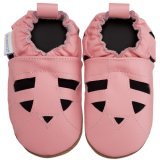
- Conflict of Interests: Parents force their toddlers to wear shoes. Children at this age view this as unnecessary, and try to assert their own identity, by simply throwing the shoes away. What results is a power struggle between the parent and the baby.
- Natural vs. unnatural: A child refusing to wear shoes is not abnormal. In fact what seems unnatural is the parent’s insistence that the child wear shoes. Nature protects children’s feet by providing them with padded soles and toes to retain their balance. Your baby has just started experiencing different surfaces such as grass, wooden floors, and your home carpet. It is expected that the child enjoys being barefoot.
- Discomfort: Some baby’s first shoes may be simply too small or too big for their feet. Some children may not like the idea of a foreign object on their body.
Of course, as a parent, it is important to ensure that your child’s feet are protected from snow, dirt, broken glass, and other sharp objects.
Here are some strategies that you can adopt to change your baby’s outlook towards the first shoes:
- Be positive – Use praise and motivation to help your child view wearing shoes as a good thing to do. Shouting, yelling, and the use of force will make the baby associate first shoes with negative feelings.
- Make it fun – Make it fun for your child to wear shoes. Use music, dance, toys, or any favorite activity that your baby likes, while you slip the shoe on the child’s foot. Allow the baby to choose a favorite color or style. Reserve these baby’s first shoes as “fun shoes” for special events such as a trip to the zoo.
- Use the correct shoe – Frequently, parents buy baby’s first shoes without realizing how uncomfortable they are for their kids. Buy the right fit. Check if the shoe is light enough so that the child feels close to the experience of being barefoot.
- Barefoot is not a bad option – If nothing works, and if it is safe for the baby to do so, allow the child to remain barefoot.